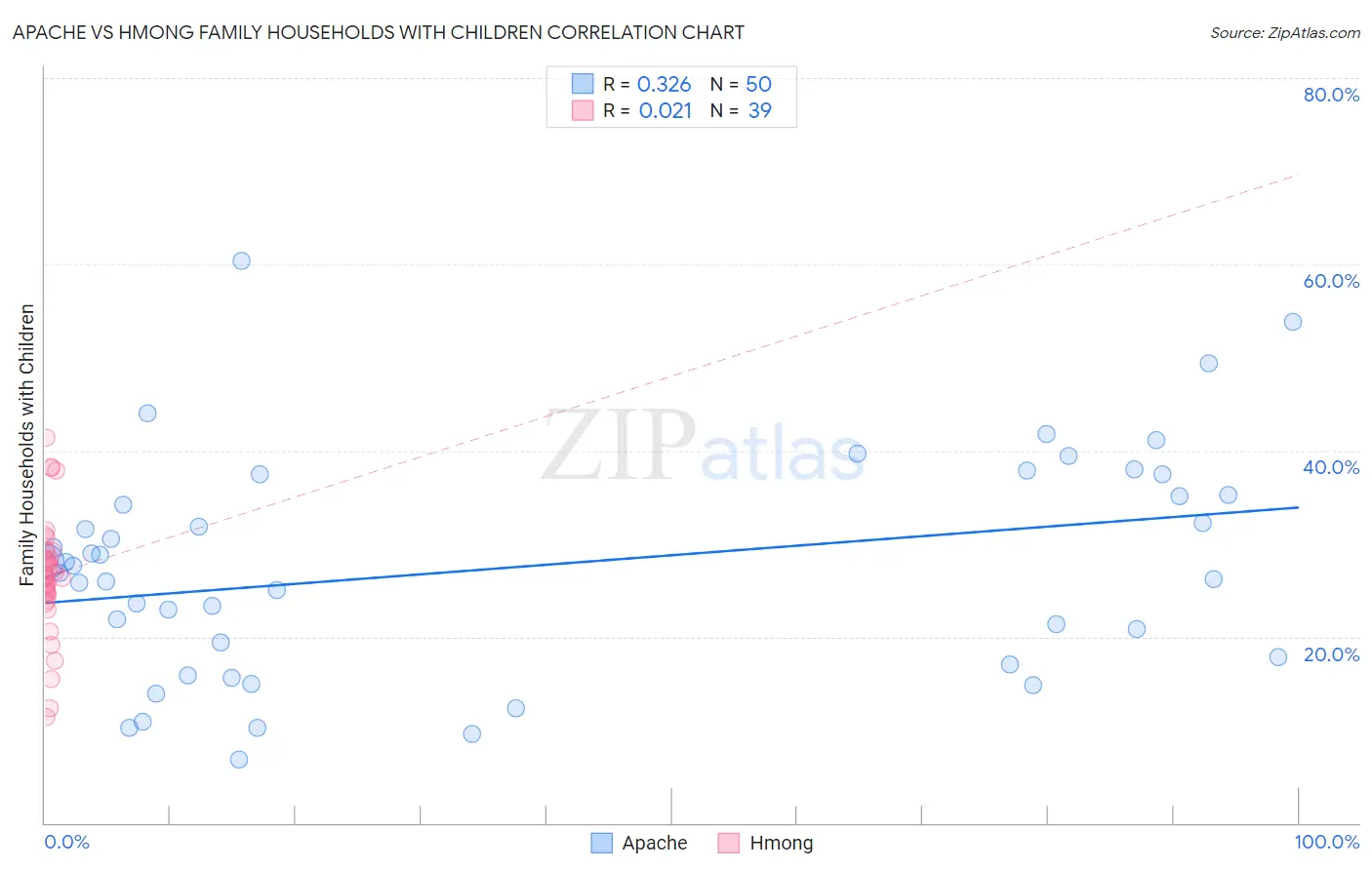Apache vs Hmong Family Households with Children
COMPARE
Apache
Hmong
Family Households with Children
Family Households with Children Comparison
Apache
Hmong
29.0%
FAMILY HOUSEHOLDS WITH CHILDREN
100.0/ 100
METRIC RATING
48th/ 347
METRIC RANK
28.6%
FAMILY HOUSEHOLDS WITH CHILDREN
99.9/ 100
METRIC RATING
60th/ 347
METRIC RANK
Apache vs Hmong Family Households with Children Correlation Chart
The statistical analysis conducted on geographies consisting of 231,023,024 people shows a mild positive correlation between the proportion of Apache and percentage of family households with children in the United States with a correlation coefficient (R) of 0.326 and weighted average of 29.0%. Similarly, the statistical analysis conducted on geographies consisting of 24,678,157 people shows no correlation between the proportion of Hmong and percentage of family households with children in the United States with a correlation coefficient (R) of 0.021 and weighted average of 28.6%, a difference of 1.4%.

Family Households with Children Correlation Summary
| Measurement | Apache | Hmong |
| Minimum | 6.8% | 11.4% |
| Maximum | 60.3% | 41.4% |
| Range | 53.6% | 30.0% |
| Mean | 27.5% | 26.5% |
| Median | 27.2% | 26.4% |
| Interquartile 25% (IQ1) | 17.8% | 24.5% |
| Interquartile 75% (IQ3) | 35.2% | 29.2% |
| Interquartile Range (IQR) | 17.4% | 4.7% |
| Standard Deviation (Sample) | 11.9% | 6.3% |
| Standard Deviation (Population) | 11.8% | 6.2% |
Demographics Similar to Apache and Hmong by Family Households with Children
In terms of family households with children, the demographic groups most similar to Apache are Peruvian (29.0%, a difference of 0.030%), Immigrants from Philippines (29.0%, a difference of 0.040%), Jordanian (29.0%, a difference of 0.090%), Fijian (29.0%, a difference of 0.13%), and Immigrants from Taiwan (29.0%, a difference of 0.18%). Similarly, the demographic groups most similar to Hmong are Immigrants from Nigeria (28.6%, a difference of 0.060%), Immigrants from Ghana (28.6%, a difference of 0.070%), Egyptian (28.6%, a difference of 0.080%), Immigrants from Lebanon (28.6%, a difference of 0.090%), and Filipino (28.6%, a difference of 0.16%).
| Demographics | Rating | Rank | Family Households with Children |
| Immigrants | Taiwan | 100.0 /100 | #44 | Exceptional 29.0% |
| Fijians | 100.0 /100 | #45 | Exceptional 29.0% |
| Immigrants | Philippines | 100.0 /100 | #46 | Exceptional 29.0% |
| Peruvians | 100.0 /100 | #47 | Exceptional 29.0% |
| Apache | 100.0 /100 | #48 | Exceptional 29.0% |
| Jordanians | 100.0 /100 | #49 | Exceptional 29.0% |
| Immigrants | Immigrants | 100.0 /100 | #50 | Exceptional 28.9% |
| Immigrants | Peru | 100.0 /100 | #51 | Exceptional 28.9% |
| Guatemalans | 100.0 /100 | #52 | Exceptional 28.9% |
| Immigrants | Cambodia | 100.0 /100 | #53 | Exceptional 28.9% |
| Sierra Leoneans | 100.0 /100 | #54 | Exceptional 28.9% |
| Immigrants | Asia | 100.0 /100 | #55 | Exceptional 28.8% |
| Immigrants | Guatemala | 100.0 /100 | #56 | Exceptional 28.8% |
| Danes | 100.0 /100 | #57 | Exceptional 28.7% |
| Hawaiians | 100.0 /100 | #58 | Exceptional 28.7% |
| Immigrants | Nigeria | 100.0 /100 | #59 | Exceptional 28.6% |
| Hmong | 99.9 /100 | #60 | Exceptional 28.6% |
| Immigrants | Ghana | 99.9 /100 | #61 | Exceptional 28.6% |
| Egyptians | 99.9 /100 | #62 | Exceptional 28.6% |
| Immigrants | Lebanon | 99.9 /100 | #63 | Exceptional 28.6% |
| Filipinos | 99.9 /100 | #64 | Exceptional 28.6% |